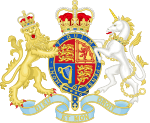Financial Secretary to the War Office facts for kids
Quick facts for kids United KingdomOffice of the Financial Secretary to the War Office |
|
|---|---|

Seal of H.M. Government
|
|
| War Office | |
| Style | The Right Honourable (Formal prefix) Financial Secretary to the War Office |
| Seat | Westminster, London |
| Appointer | The British Monarch on advice of the Prime Minister |
| Term length | No fixed term |
| Formation | 1870-1964 |
| First holder | John Vivian |
| Final holder | Peter Kirk |
The Financial Secretary to the War Office was an important job in the British government. It was like a junior minister who helped manage money for the army. This role started in 1870. Sometimes, it was called the Finance Member of the Army Council.
In May 1947, this job combined with another role. It became the Parliamentary Under Secretary of State and Financial Secretary of the War Office. The job continued until April 1964. That's when the War Office joined with other defense departments. They all became part of the Ministry of Defence.
Contents
History of the Financial Secretary's Role
Setting Up the Financial Secretary's Office
In 1870, the Financial Secretary to the War Office was created. This person reported to the Secretary of State for War. Their main job was to handle money matters for the military. This included checking how much money was needed. They also made sure money was spent correctly. And they checked all the financial records.
Before this, a chief auditor handled army accounts. But that job was ended. Its tasks moved to a new Finance Department. This department was led by the Accountant General. The Accountant General then reported to the Financial Secretary.
Changes and New Responsibilities
Between 1887 and 1888, the War Office changed how it was organized. The Financial Secretary got more duties. By the end of 1888, their department was called the Civil Department. The Finance Department also grew bigger. It was renamed the Finance Division. The Accountant General still oversaw this division.
In 1895, the Accountant General's title changed. They became the Assistant Financial Secretary and Accountant General of the Army. In 1902, the Finance Division was renamed the Finance Branch.
Becoming the Finance Member of the Army Council
In 1904, the Financial Secretary got a new title. They became the Finance Member (FM) of the Army Council. This meant they were in charge of all army finances. From 1907 to 1922, their department was called the Department of the Finance Member.
Then, from 1922 to 1939, both the title and department changed again. They became the Department of the Financial Secretary. In 1942, the office and department went back to their old name. They were again the Department of the Finance Member. During these years, some daily tasks of the office moved to another department.
Combining Roles and the End of the Office
In May 1947, the Army Council was reorganized. The Financial Secretary's job combined with another role. It became one position: the Parliamentary Under Secretary of State and Financial Secretary to the War Office. This combined role lasted until 1964.
Before 1947, the office had many different departments. After 1947, the person in this role mainly focused on the political side of money decisions. They no longer had many other specific duties.
People Who Held the Office
Many people served as the Financial Secretary to the War Office. Here is a list of some of them:
| Date | Name |
|---|---|
| 1870–1871 | John Vivian |
| 1871–1874 | Henry Campbell-Bannerman |
| 1874–1877 | Hon. Frederick Stanley |
| 1877–1880 | Robert Loyd-Lindsay |
| 1880–1882 | Henry Campbell-Bannerman |
| 1882–1885 | Sir Arthur Hayter, Bt |
| 1885–1886 | Henry Northcote |
| 1886–1886 | Herbert Gladstone |
| 1886–1892 | Hon. St John Brodrick |
| 1892–1895 | William Woodall |
| 1895–1900 | Joseph Powell Williams |
| 1900–1903 | Lord Stanley |
| 1903–1905 | William Bromley-Davenport |
| 1905–1908 | Thomas Buchanan |
| 1908–1910 | Francis Dyke Acland |
| 1910–1911 | Charles Mallet |
| 1911–1912 | Harold Tennant |
| 1912–1915 | Harold Baker |
| 1915–1915 | Francis Dyke Acland |
| 1915–1919 | Henry Forster |
| 1919–1921 | Sir Archibald Williamson, Bt |
| 1921–1922 | Hon. George Frederick Stanley |
| 1922–1923 | Francis Jackson |
| 1923–1924 | Rupert Gwynne |
| Jan–Nov, 1924 | Jack Lawson |
| Nov, 1924–1928 | Douglas King |
| 1928–1929 | Duff Cooper |
| 1929–1930 | Manny Shinwell |
| 1930–1931 | Captain, William Sanders |
| 1931–1934 | Duff Cooper |
| 1934–1935 | Douglas Hacking |
| 1935–1940 | Sir Victor Warrender, Bt |
| 1940–1940 | Sir Edward Grigg |
| 1940–1941 | Richard Law |
| 1941–1943 | Duncan Sandys |
| 1943–1945 | Arthur Henderson |
| May–Aug, 1945 | Maurice Petherick |
| Aug 1945–1946 | Frederick Bellenger |
| 1946–1947 | John Freeman |
| 1947–1951 | Michael Stewart |
| 1951–1951 | Woodrow Wyatt |
| 1951–1954 | James Hutchison |
| 1954–1957 | Fitzroy Maclean |
| 1957–1958 | Julian Amery |
| 1958–1960 | Hon. Hugh Fraser |
| 1960–1963 | James Ramsden |
| 1963–Apr. 1964 | Peter Kirk |
Sources
- "Financial Secretary to the War Office (Hansard)". api.parliament.uk. Hansard. Retrieved 25 September 2019.
- Joiner, J. H. (1990). One more river to cross : the story of British military bridging. Barnsley: Pen and Sword. ISBN: 9780850527889.
- Roper, Michael (1998). The Records of the War Office and Related Departments, 1660-1964. London: Public Record Office. ISBN: 9781873162453.
 | Roy Wilkins |
 | John Lewis |
 | Linda Carol Brown |

